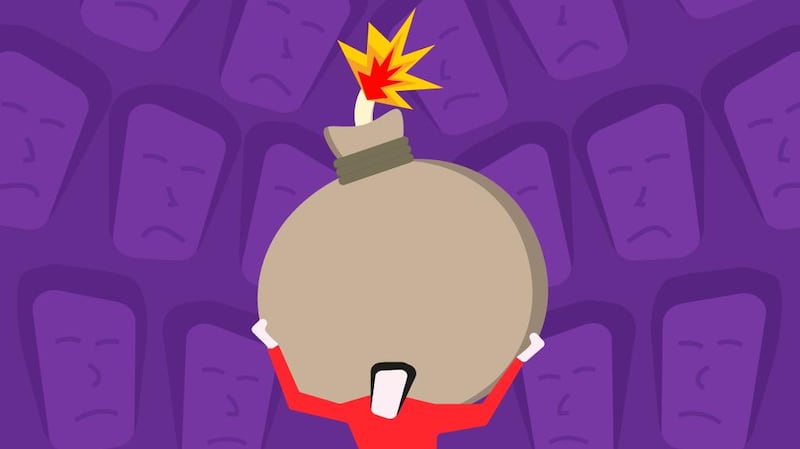My husband worked in the UAE for 12 years and I joined him seven years ago after we got married. Last December, he was unexpectedly terminated from his job as a sales executive, which paid Dh5,500 a month. Now he is back in our home country with me and our two little boys. We are pretty helpless as my husband has built up Dh900,000 in debt that he owes to friends and colleagues. I really don’t know how he ended up owing so much. There may even be a police case against us and as a wife and mother I am totally destroyed by this situation. The problems started because he felt the UAE was the “land for business”, so he borrowed Dh200,000 from a friend. He thought he could easily find something to do with the money but the friend gave the money to him with a monthly profit – something I was not aware of. His business plan did not work out but he pretended to me that it was working because he thought I would be hurt if he was seen as a failure. From there he started to borrow from friends in the UAE and back home – and that’s how it escalated to Dh900,000. We sold the small house we own as well as some jewels and paid off Dh200,000 but there is still Dh700,000 more to pay. There is nothing else we can sell, no family members to turn to for help because he has already borrowed from them. For his UAE friends, he owes Dh450,000 and this is very tough as they are giving us a lot of pressure causing my husband to feel depressed. Initially they wanted the money within eight months – now they want it next week. The remaining Dh250,000 needs to go to our family, who we have told we earn well and that we can repay them within two years. My husband was in the UAE on a visit visa looking for work but he became so depressed that I asked him to return to Sri Lanka last week. There is no one to help us, as we are not wealthy. Can any charitable organisations help? I really don’t know what to do. SK, Sri Lanka
Debt panellist 1: Shaker Zainal, head of retail banking at CBI bank
It is unfortunate your husband seems to have borrowed excessively and without a regular source of income. Firstly, he should try to find a job either in the UAE or Sri Lanka. In the meantime, he may engage with the lenders and attempt to agree on a long-term payment plan. The fact that you have sold your assets to be able to pay back your debts is a sign of good will, but with no further assets to sell, finding a job that generates regular income is the most sensible thing to do.
Secondly, if you are able to get support from your parents or relatives to look after your children, you may consider working as well. Since you are in Sri Lanka at the moment, it would be sensible to explore what other sources of relief you may be able to get, through local governmental agencies or debt counselling services that might be able to provide advice and support.
______
Read more:
The Debt Panel: 'I've borrowed Dh70,000 to support my family in India'
Ramadan spirit: Generous readers clear single mother's debts after The National plea
The Debt Panel: Dubai resident receives over 100 calls in one week from a debt collection agent
_____
Debt panellist 2: Ambareen Musa, founder and chief executive of Souqalmal.com
Now that your husband is back in Sri Lanka, he must find a job as soon as possible. Since you are out of options and have already liquidated your savings, the best solution would be for both you and your husband to find jobs that can help sustain your family and repay the debts one at a time. In the meantime, ask your husband to keep an eye out for employment opportunities in the UAE, since these will most likely pay better than a job back home.
Regaining employment is the only way either of you will be able to access bank finance. A salary-linked personal loan could potentially help you pay off some of the debt you owe. But avoid getting wrapped up in credit card debt - this will only make your overall debt situation worse.
Since you first have to repay the debt worth Dh450,000 that you have accumulated in the UAE, you must negotiate with your lenders about easing the terms of repayment. You will have to find a way to work towards paying it all off systematically, making regular payments on a monthly basis.
The Sri Lanka Banks' Association also offers a credit counselling service to help guide struggling borrowers. Credit counsellors can help you work out a financial plan to make debt repayment less burdensome for you. You can find more details about how to get in touch with the credit-counselling centre here: www.slba.lk/news/credit-counseling-centre.php.
______
Read more:
The Debt Panel: Single mother of four is being hounded by debt collectors over Dh43,000
It is possible to restructure debt directly with UAE banks, a Sharjah resident reveals how
A nine-step guide to help you renegotiate bank debts in the UAE
How an Abu Dhabi resident took three UAE banks to court and cleared Dh700,000 debt
______
Debt panellist 3: Rasheda Khatun Khan, a wealth and wellness planner and founder of Design Your Life
You are torn between bad decisions, blame, debt and being a supportive wife and this can be a very challenging position. Well done on pulling through so far and your continued support and care is I'm sure greatly appreciated by your husband and family. Focusing on solutions is now key.
Start with getting back on your feet in Sri Lanka. Get a stable household income and then start all over again. Prioritise your debt in order of full repayment with the intent to clear off on terms that are affordable to you. Find a comfortable monthly amount you can commit towards repaying your debt then write a letter of intent to each of your creditors stating that you intend to repay back the loan and you will make repayments as soon as physically possible. Use your monthly "repaying debt" budget, to either pay off one loan at a time or distribute the budget to make repayments to the loans you need to make contributions to. It is really important you commit to a budget that is affordable otherwise you end up back in the same place of making promises to repay that you cannot keep.
At the same time, it is really important to build up an emergency fund and a savings account. Unknown or miscellaneous expenses come up all the time so having these accounts will ensure you do not increase your debt any further.
It is not usual for charity organisations to use funding to repay people's debt. Funds are typically used to pay for the person's need, for example, to pay for certain medical bills, flights for repatriation, food and other aids. Perhaps you can explore charity options in Sri Lanka to see if they can support your monthly needs. Also explore government aid and see if there is a Sri Lankan organisation that offers support.
It is also really important to find emotional support for the both of you. Depression can get out of hand if you do not address it. Perhaps look into some counselling to help you both on a psychological level. You will really need to ensure your health is in great shape so you can be strong enough and in the right frame of mind to get good employment and be clear minded to see solutions. It will also help you be in the right mindset when you are taking care of your children.
Money certainly does not always come easy. And making money using funds from others requires knowhow and skill and should be done with thought and care. Understanding the market and taking trusted advice can help you make sound decisions. It sounds as though your husband has a real skill in persuasion and influence and perhaps he can explore job opportunities that require such skills. Use your frustration and anger and help your husband use his depression as fuel to give you the drive and motivation to find a way out.
The Debt Panel is a weekly column to help readers tackle their debts more effectively. If you have a question for the panel, write to pf@thenational.ae







